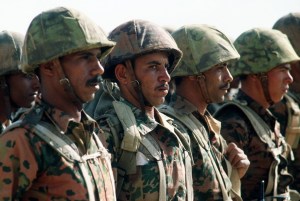
Proponents of this interpretation share a belief that the government transition in Egypt plays fully into the hands of the United States, Israel and Saudi Arabia. The Israelis are happy about the military’s rise to power, and the Saudis were quick to declare their support for the new regime.
Former CIA analyst Paul Pillar wrote that Israeli authorities continue to lobby for Western and American support for As-Sisi and his team, even though Israel does not officially recognize the new government.
Analysts are divided about the United States’ attitude toward the transition of power. One of the founders of the Muslim-Christian-Jewish Alliance in the U.S., Kevin Barrett, thinks it’s obvious that the U.S., Israel and Saudi Arabia were behind Morsi’s ouster. He writes that they were driven by concerns that under the Islamists Egypt had begun drifting out of the orbit of neocolonial dependence and moving toward greater self-reliance. The experiment of Muslim Brotherhood rule was dangerous for the ruling authorities in Saudi Arabia.
Another American researcher, Daniel Greenfield, believes just the opposite, that all Egypt’s misfortunes came from the Muslim Brotherhood, which he considers destructive. The Brotherhood demonstrated that during the two years of its reign. Greenfield castigates all the various Western liberals who today are calling for an end to foreign aid to Egypt, which he says is tantamount to indulging the worst of international terrorist outfits. Curbing the violence requires crushing the Muslim Brotherhood.
In the opinion of researcher R. Esсobar, Washington has been controlling both the Muslim Brotherhood and As-Sisi’s army, so on the surface it is in a triumphant position following these events. Hawks in Washington have taken a pro- military stance, while liberal imperialists side with the Brotherhood. The latter have staked out an Islamic populist position in a neoliberal economic niche. They want to cooperate with the IMF without threatening Israel, the author argues.
A number of observers are paying attention to statements by some former prominent American politicians who say that current realities require the country to make policy corrections and adopt a more sober approach. According to them, Washington should temper its ambitions and work with the transitional government to strengthen principles of accountability even if “the ruling power is not democratic.”
These themes are evident in the speeches of Charles Kupchan, a professor and former National Security Council staffer under President Clinton, and Leslie Gelb, a former deputy secretary of state in the Carter administration.
At the same time, some experts warn of the distress lurking in this round of tension in Egypt. The security situation in the Sinai, which has caused trouble in the past, has worsened after the removal of Morsi, concludes the French specialist on Egypt Sophie Paumier. In her view, terrorist violence could spread from the Sinai Peninsula to Egypt’s interior.
According to Doudou Diene, vice president of the Scientific Council at the Edgar Morin International Institute of Political Studies, three key themes have emerged in the discussions of the Western scientific community in recent weeks: that this was a military coup of a popular nature; that the practice of democracy isn’t solely a matter of holding an election; and that the death knell has sounded for political Islam. The author puts forth a set of arguments that resonate with the discussions of these core theses. The election of President Morsi, the country’s first following a half-century of authoritarian rule, was not sufficient to give legitimacy to his rule because democracy is not practiced only by means of an election.
However, despite the differing assessments that have resulted from the events of the past week in Egypt, experts from various countries have generally formed a consensus opinion. The military coup was a response to the demands of the masses, personified by the powerful demonstrations in Tahrir Square and the calls for change by millions of citizens. Political Islam has signed its own death warrant, showing after a year in power that it is incapable of responding to the social demands of the people, particularly the demands voiced as a result of the constant interruptions of electrical power, running water and so forth.
Yury Zinin is a senior researcher at the Moscow State Institute and a contributor to the online magazine New Eastern Outlook.
